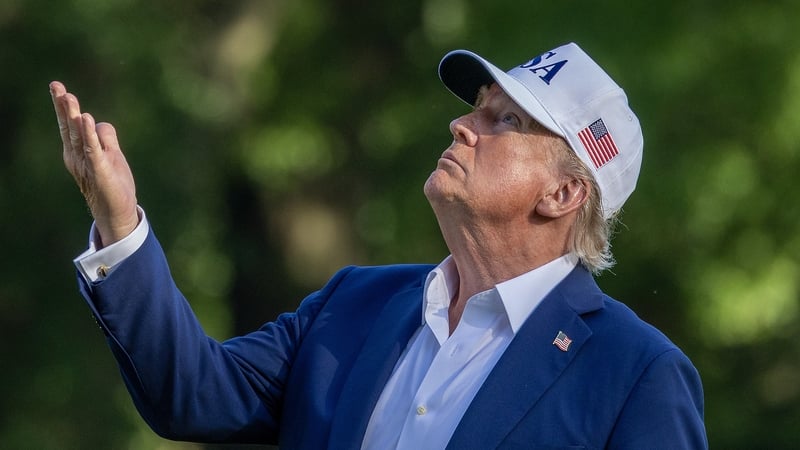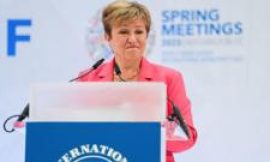Analysis: The US president’s approach to trade is shaped by hubris, a poor grasp of policy tools and his distrustful nature
US president Donald Trump’s threat to impose a 30% tariff on EU imports from August 1st is his latest attempt to use economic pressure to extract concessions from US trading partners. With billions in trade hanging in the balance, his ultimatum has prompted European leaders to condemn the move, prepare retaliatory tariffs for American goods, and scramble to negotiate a settlement that may partially restore Biden-era terms of trade.
Trump’s obsession with levying tariffs on America’s friends and foes alike has been roundly criticised by top economists. It is driven by a unique combination of personality traits that have led him to misunderstand his capacity to use tariffs as a coercive weapon, the impact of tariffs on economic behaviour, and the intentions of foreign political leaders.
We need your consent to load this rte-player contentWe use rte-player to manage extra content that can set cookies on your device and collect data about your activity. Please review their details and accept them to load the content.Manage Preferences
From RTÉ’s Behind the Story, Trump, tariffs and the possible impact on Irish dairy and whiskey
Three aspects of his personality set him apart from other US presidents. First, Trump sees himself as the most intelligent and well-informed person in any setting, no matter the topic. He frequently proclaims that he is “never wrong” and that he has “a much higher IQ” than any of his predecessors or political opponents.
This inflated self-perception has led him to overestimate his ability to use tariffs to bend foreign leaders to his will on any issue. On July 11th, he pledged a 30% tariff on EU goods to address “long-term-large, and persistent, trade deficits” while simultaneously threatening Canada with a 35% tariff to try to stop the flow of fentanyl across the Canada-US border. Weeks earlier, he threatened Spain with additional tariffs after its prime minister rejected NATO’s new defence spending target.
Despite his staunch belief in his ability to use tariffs to get what he wants, his track record is mixed, at best. On April 25th, he claimed he could use tariffs to quickly pressure the leaders of up to 200 countries into signing trade deals highly favourable to the US. So far, he has only convinced the United Kingdom, China, and Vietnam to sign new agreements.
We need your consent to load this rte-player contentWe use rte-player to manage extra content that can set cookies on your device and collect data about your activity. Please review their details and accept them to load the content.Manage Preferences
From RTÉ Radio 1’s Today with Claire Byrne, Dan O’Brien from the Institute of International and European Affairs and Pat Leahy from The Irish Times on the impact of Trump’s tariffs on the Irish economy
None of these involved changes that should significantly alter the balance of trade between the signatories. They merely establish tariffs at a lower level than those Trump imposed earlier this year – 20% rather than 46% in the case of the agreement with Vietnam. In other words, these deals are not only still costly for both sides, but also ineffective, as they are unlikely to meaningfully reduce American imports or boost exports.
Another significant aspect of the president’s personality is that he places little value on trying to understand inanimate phenomena, such as how public policy tools function. This makes him vulnerable to misperceiving how import tariffs, which are taxes levied on goods brought into a country, affect businesses and consumers.
Critically, he takes great satisfaction in levying import tariffs because he wrongly believes they are paid by businesses located in the countries that export goods to America. In reality, American businesses and consumers pay these costs. When the president claims that his administration is “making a fortune with tariffs – $2 billion a day,” he is unknowingly bragging about imposing economic hardships on his own citizens.
We need your consent to load this rte-player contentWe use rte-player to manage extra content that can set cookies on your device and collect data about your activity. Please review their details and accept them to load the content.Manage Preferences
From RTÉ Radio 1’s This Week, is a trade war looming after Donald Trump’s announcement of 30% tariffs on the EU?
Trump’s poor understanding of how public policy tools work is also reflected in his inability to recognise the inherent contradiction between his two central claims about how tariffs will supposedly benefit the US. On the one hand, he argues that imposing steep tariffs will raise so much revenue for the American government that it will be able to eliminate income taxes. This would require tariffs to be both permanent and extremely high – at least 100-percent – to replace the more than $3 trillion in annual revenue currently generated by income taxes.
On the other hand, he alleges that “jobs in factories will come roaring back into our country” as American consumers turn away from highly tariffed imports and buy more goods produced by American workers. These two objectives are directly – and to many outside observers, obviously – at odds. If American tariff rates stay high enough that demand for imported goods falls to the point where millions of American manufacturing jobs return, then the revenue generated from tariffs will collapse.
Conversely, if the president wants to continue generating significant revenue from tariffs, he will need to strike deals with other countries that lower tariffs to a level – say, 10 to 20% – at which foreign businesses believe their goods can still be sold at a competitive price in the US market. This, in turn, will largely remove the need to create millions of new American manufacturing jobs. It is, therefore, impossible to use tariffs to raise unprecedented revenue and reshore a significant number of manufacturing jobs at the same time; nevertheless, the president’s personality renders him incapable of understanding this.
We need your consent to load this rte-player contentWe use rte-player to manage extra content that can set cookies on your device and collect data about your activity. Please review their details and accept them to load the content.Manage Preferences
From RTÉ Radio 1’s The Business, former Governor of the Central Bank and Honorary Professor of Economics at TCD Patrick Honohan, on Trump, tariffs, and the transatlantic tango
Finally, Trump is far more distrustful of other people than any other occupant of the White House. This aspect of his personality has led him to presume that the leaders of America’s trading partners want to exploit and undermine his country through what he considers “unfair” trade practices. As a result, he feels justified in using tariffs to punish other countries for “cheating” on international trade agreements by, for example, achieving an overall trade surplus with the US or a surplus in a particular product category or by imposing regulations, like food safety standards, that American businesses are unwilling to meet.
This aspect of his personality also makes it unlikely that he will honour the terms of any new trade agreement with the EU. Regardless of what he agrees to in the short term, he will likely soon conclude that the EU is attempting to take advantage of the US and respond with new tariffs to counter it.
Given the nature of his personality, European leaders should view any agreement that may be reached in 2025 as a temporary ceasefire
European leaders should take note of his recent criticism of the United States-Mexico-Canada Agreement. In January 2020, he hailed his own trade accord as the “best agreement we’ve ever made.” By February 2025, he was publicly asking “who would ever sign a thing like this?” right before announcing new tariffs on Canada and Mexico for “taking advantage” of his country.
Trump’s approach to trade is shaped by his hubris, a poor grasp of policy tools and distrustful nature and has left trade partners wary and US industries in turmoil. Given the nature of his personality, European leaders should view any agreement that may be reached in 2025 as a temporary ceasefire rather than the foundation for a lasting peace in his pathological trade war.
Follow RTÉ Brainstorm on WhatsApp and Instagram for more stories and updates
The views expressed here are those of the author and do not represent or reflect the views of RTÉ




